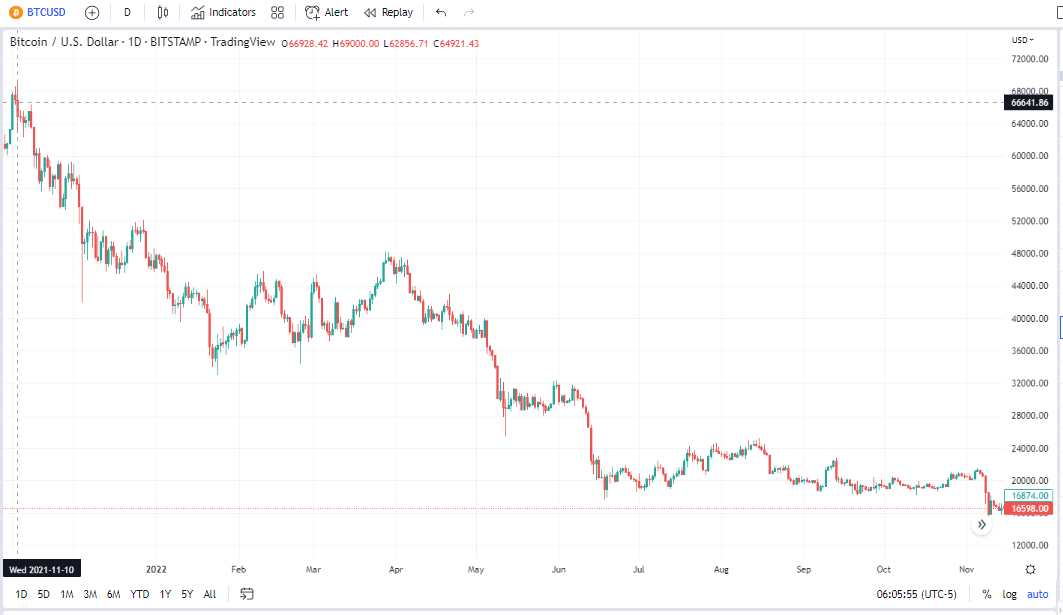The FTX saga and Sam Bankman-Fried's illegal and extremely unethical actions capture much of the financial press’s attention right now. For good reason. The real-life story has echoes of Long-Term Capital Management, Enron, Tyco, Lehman Brothers, and Bernie Madoff all rolled up into one. More broadly, though, without much fanfare, we crossed the one-year anniversary of the top in crypto.
Last November, Total Crypto Market Cap Reached $3 Trillion

Source: TradingView
It was on Nov. 10, 2021, when Bitcoin reached an all-time high of $69,000. Since then, the pain trade has been lower for the HODLers as all digital assets from the major coins to altcoins to stablecoins have endured volatility and high uncertainty. Crypto lenders and so-called exchanges have gone bankrupt, and investors are left wondering what to do with (and where to keep) their assets.
I have five lessons traders can learn in light of the past year’s wild price action and bearish narratives that now cast a shadow over the once-darling crypto universe.
1. Position Sizing
It is generally thought that the more volatile an asset is expected to be, the smaller you should make it a part of your portfolio. Whether it’s crypto or stock, if the implied volatility (IV) is, say, 100%, then perhaps a 1% size is right. If the IV is relatively low near 25%, then a 4% stake could be right. You do you, but this general rule can help you sleep at night and better manage risk.
2. FOMO Is Real
The fear of missing out (FOMO) was intense in crypto during 2020 and 2021. Money was burning holes in folks’ pockets, we were all bored and cooped up at home much of the time, and we couldn’t help but notice seemingly everyone else making scores in stocks and crypto. One survey revealed that 70% of crypto holders began investing in 2021. Those folks are now the bagholders, unfortunately.
3. A Trade Vs. an Investment
How often have you bought a stock only to see it drop in value immediately? It happens to all of us. The differentiator between good traders and those who struggle is often cutting losses short and not letting a short-term trade end up being a long-term loser in your portfolio. Knowing your timeframe is important – and that goes for the exit side of the trade.
4. Use Leverage Wisely
Answer this: If you could have bought Amazon (NASDAQ:AMZN) at its IPO price in 1997, how much money would you have borrowed to enhance your long-run return? Three times, 4x? More? If so, you’d have been wiped out during the dot-com crash. Leveraging a volatile asset, like bitcoin or ether, spells eventual doom for even seasoned traders.
5. Have a Plan with Cash
This last one applies to me big time. I admit I had a high cash buffer for much of 2021 as stocks and crypto soared. It felt awful. I opened up a few alternative asset accounts since savings account yields were near 0%. Those have fared okay, but the complexity, extra tax burden, and just having to check another account periodically makes it seem not worth it. Many investors had swelling checking account balances care of the COVID stimulus programs and felt they had to do something with it—hello crypto. So, it may have been an investment born by boredom rather than a truly thoughtful asset allocation decision.
The Bottom Line
The one-year anniversary of the crypto top and unfortunate timeliness of the FTX blowup makes it an opportunistic time to review your investing and trading plans. Set rules for yourself and always be mindful of careless investment decisions.
Disclaimer: Mike Zaccardi does not own any of the securities mentioned in this article.
